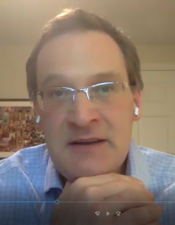Behavioral Health Services during COVID
Posted April 14th, 2021 by EllaCategories: Programs
Lisa Beitz, executive director of Region Ten Community Services, and Rebecca Kendall, director of the Community Mental Health and Wellness Coalition spoke at the April SSV meeting on the behavioral health services available to the greater Charlottesville community. The program was moderated by SSV President Jeff Gould who recently completed six years serving on the Board of the Region Ten Community Services.
The Zoom video is available by clicking youtube.com/watch?v=bRZ0Y12bPTU
 Lisa Beitz is the executive director for Region Ten Community Services Board. This is the public behavioral health safety net serving the City of Charlottesville and the counties of Albemarle, Fluvanna, Greene and Nelson. Lisa is a doctoral candidate in social work, has a master’s degree in social work, and holds a license as a clinical social worker (LCSW). Lisa has worked for 29 years in various public and nonprofit settings that serve the most vulnerable people in our communities. Lisa believes that “there but for the grace of God go I”: we are all vulnerable to experiencing a behavioral health challenge, so we must embrace other people’s struggles as if they were our own. Lisa is a leader who is amazed by incredible resiliencies all people possess and believes in services and supports that honor and respect the unique recovery journey for each individual.
Lisa Beitz is the executive director for Region Ten Community Services Board. This is the public behavioral health safety net serving the City of Charlottesville and the counties of Albemarle, Fluvanna, Greene and Nelson. Lisa is a doctoral candidate in social work, has a master’s degree in social work, and holds a license as a clinical social worker (LCSW). Lisa has worked for 29 years in various public and nonprofit settings that serve the most vulnerable people in our communities. Lisa believes that “there but for the grace of God go I”: we are all vulnerable to experiencing a behavioral health challenge, so we must embrace other people’s struggles as if they were our own. Lisa is a leader who is amazed by incredible resiliencies all people possess and believes in services and supports that honor and respect the unique recovery journey for each individual.
 Rebecca Kendall is the director of the Community Mental Health and Wellness Coalition. She has a master’s in social work and over two decades of leadership experience in community health. She is passionate about promoting health equity and building effective collaborations to improve mental health and wellbeing in our community. She is also a mom of a teen and a tween and is juggling many balls during COVID homeschooling.
Rebecca Kendall is the director of the Community Mental Health and Wellness Coalition. She has a master’s in social work and over two decades of leadership experience in community health. She is passionate about promoting health equity and building effective collaborations to improve mental health and wellbeing in our community. She is also a mom of a teen and a tween and is juggling many balls during COVID homeschooling.
Program Summary
Rebecca Kendall stated that the Community Mental Health and Wellness Coalition collaborates with providers through planning, advocacy and delivery of effective services to promote behavioral health and wellness. She stated that all their services have been affected by COVID. Problems occurring include effects of social isolation, food insecurity, unemployment and school closings among others. Some of the consequences have been increased alcohol consumption, increase in requests for services and overdoses seen in ERs. On the positive side the increase in Zoom telehealth services, where available, has been very fruitful. Two new services have been developed: Warmline–to help people who are stressed and to connect them to local care (877-349-6428), and a free service for essential workers (434-202-6322).

Rebecca Kendall, Lisa Beitz and moderator Jeff Gould
Lisa Beitz is the executive director of the Region Ten Community Services Board which is required by law to be available 24/7 to assess people for involuntary hospitalization and case management assessment for individuals with developmental disabilities and mental health disorders as funds allow. Region Ten serves the City of Charlottesville and the Counties of Albemarle, Fluvanna, Greene and Nelson, and is involved in over 40 programs and has more than 550 staff, though one-third have been furloughed as a result of COVID. Local trends exacerbated by COVID include lack of psychiatric hospital beds and closing of resources that keep individuals safe in the community leading to more hospitalizations. As the stressors increase, the need for services has increased. She concluded with the challenge of trying to create a workforce to work with challenged individuals in the future.

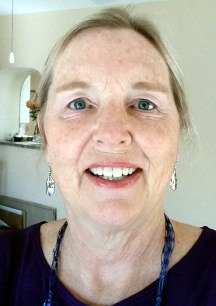 Alyson Ball addressed these things at our March meeting, which
Alyson Ball addressed these things at our March meeting, which 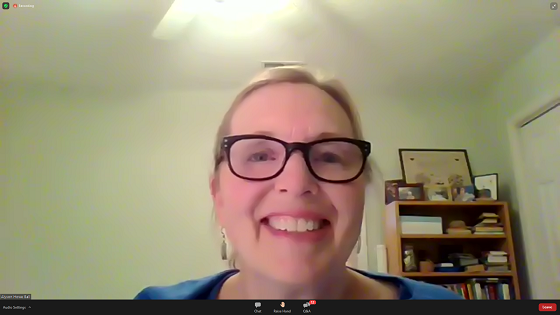

 K. Craig Kent, MD, is the executive vice president for health affairs at the University of Virginia. He is responsible for overseeing all UVA Health operations and reports directly to the president. A researcher, educator and physician, Dr. Kent is an internationally recognized leader in academic medicine. He was elected to the 2019 class of inductees into the National Academy of Medicine, one of the highest honors in the fields of health and medicine. He is the 2019-2020 chair of the American Board of Surgery.
K. Craig Kent, MD, is the executive vice president for health affairs at the University of Virginia. He is responsible for overseeing all UVA Health operations and reports directly to the president. A researcher, educator and physician, Dr. Kent is an internationally recognized leader in academic medicine. He was elected to the 2019 class of inductees into the National Academy of Medicine, one of the highest honors in the fields of health and medicine. He is the 2019-2020 chair of the American Board of Surgery.
 James Hingeley
James Hingeley  Joe Platania
Joe Platania 
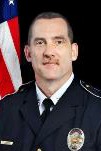

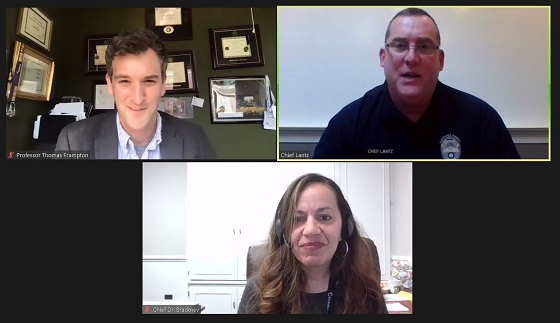
 Al Christopher has been director of the Energy Division of the Virginia Department of Mines, Minerals and Energy since March 2009. For about four years prior to that he was executive director of Virginia Clean Cities, a nonprofit coalition that promotes alternative fuel and electric vehicles. Al was a second-generation fuel distributor and a newspaper editor and reporter, working in Hampton VA; Tampa FL; and Washington DC. He has a B.S. in mass communications and an MBA, both from Virginia Commonwealth University.
Al Christopher has been director of the Energy Division of the Virginia Department of Mines, Minerals and Energy since March 2009. For about four years prior to that he was executive director of Virginia Clean Cities, a nonprofit coalition that promotes alternative fuel and electric vehicles. Al was a second-generation fuel distributor and a newspaper editor and reporter, working in Hampton VA; Tampa FL; and Washington DC. He has a B.S. in mass communications and an MBA, both from Virginia Commonwealth University. Michael Skiffington is the director of policy and planning for the Department of Mines, Minerals and Energy. He serves as the agency’s primary liaison to the General Assembly, as well as being the agency’s regulatory coordinator since January 2010, Michael also leads the agency’s strategic planning team. A lifelong Virginian, he received a bachelor’s degree in Business Administration from Old Dominion University and a law degree from George Mason University. An avid musician since the age of eight, Michael lives with his wife in downtown Richmond, anxiously awaiting the return of live music.
Michael Skiffington is the director of policy and planning for the Department of Mines, Minerals and Energy. He serves as the agency’s primary liaison to the General Assembly, as well as being the agency’s regulatory coordinator since January 2010, Michael also leads the agency’s strategic planning team. A lifelong Virginian, he received a bachelor’s degree in Business Administration from Old Dominion University and a law degree from George Mason University. An avid musician since the age of eight, Michael lives with his wife in downtown Richmond, anxiously awaiting the return of live music.

 Brian Cannon was the executive director of OneVirginia2021 for five years and lead their grassroots, nonpartisan organization in lobbying legislators to pass a constitutional redistricting reform amendment. Brian is now the executive director of FairMapsVA, a ballot campaign dedicated to educating Virginians about Amendment 1 and urging them to vote yes to end partisan gerrymandering in Virginia.
Brian Cannon was the executive director of OneVirginia2021 for five years and lead their grassroots, nonpartisan organization in lobbying legislators to pass a constitutional redistricting reform amendment. Brian is now the executive director of FairMapsVA, a ballot campaign dedicated to educating Virginians about Amendment 1 and urging them to vote yes to end partisan gerrymandering in Virginia. Christopher Ambrose is a small business owner from Fairfax County and has been a longtime community activist and long-standing advocate against gerrymandering. Mr. Ambrose supports independent redistricting and is a founding member of Fair Districts Virginia, a grassroots group that supports independent redistricting and opposes the constitutional amendment.
Christopher Ambrose is a small business owner from Fairfax County and has been a longtime community activist and long-standing advocate against gerrymandering. Mr. Ambrose supports independent redistricting and is a founding member of Fair Districts Virginia, a grassroots group that supports independent redistricting and opposes the constitutional amendment.
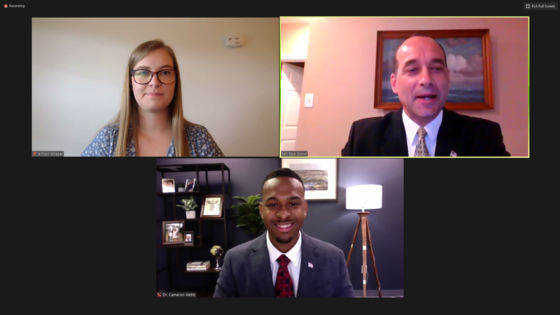



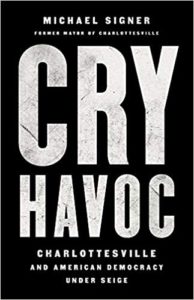 The deadly invasion of Charlottesville, Virginia, by white nationalist militias in August 2017 is a microcosm of the challenges facing American democracy. No one is better placed to tell the story of what really happened, and to draw out its larger significance, than Michael Signer, then Charlottesville’s mayor. His new book,
The deadly invasion of Charlottesville, Virginia, by white nationalist militias in August 2017 is a microcosm of the challenges facing American democracy. No one is better placed to tell the story of what really happened, and to draw out its larger significance, than Michael Signer, then Charlottesville’s mayor. His new book, 